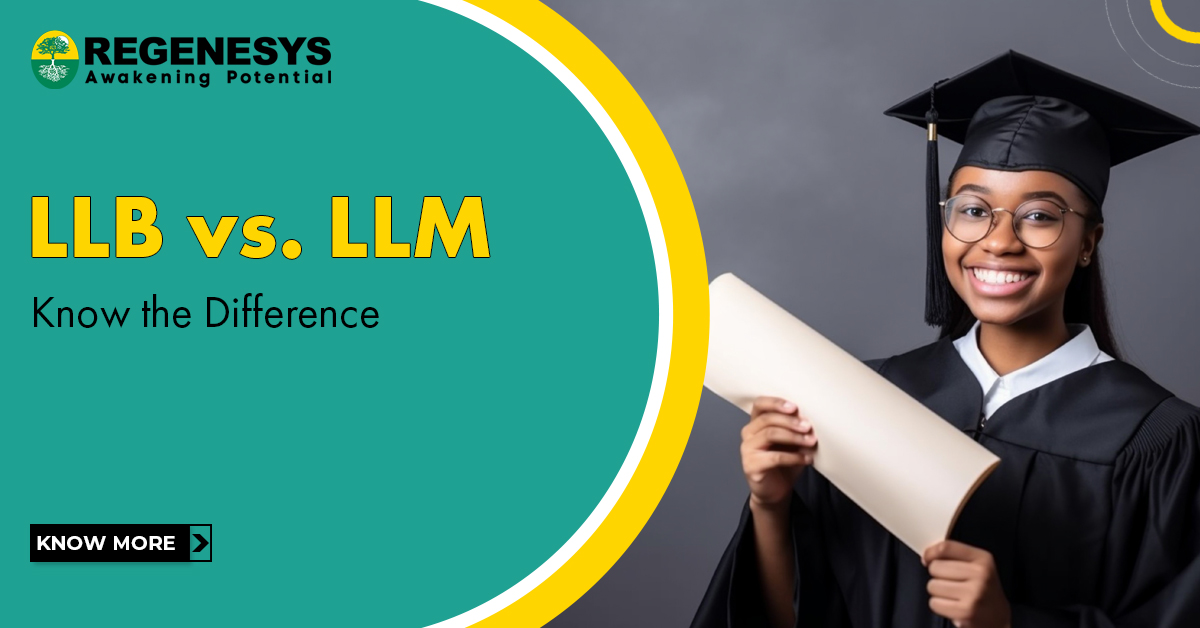When pursuing a career in law, there are various paths you can take, and choosing the right legal degree can be a challenging task. Two popular law degrees that often confuse students are the LLB and the LLM. While both are legal degrees, they differ in scope, duration, and the type of programme. Understanding the difference between LLB vs LLM is essential before choosing one that suits your career aspirations.
In this article, we’ll decode the differences between the LLB vs LLM degrees to help you decide about your legal education. Whether you’re a law student, a recent graduate, or just curious about the legal profession, this article will give you a clear understanding of these degrees and their relevance in today’s legal field.
Table of Contents
What is an LLB Degree?
The LLB, which stands for Bachelor of Laws, is an undergraduate degree programme that provides students with a comprehensive foundation in legal studies.
This Law degree is typically a four-year programme, although the duration may vary depending on the country or institution.
This Law degree or LLB programme focuses on a solid understanding of:
- Fundamental legal principles,
- Legal systems and
- Core subjects.
The core subjects include:
- Constitutional law,
- Criminal law,
- Contract law and more.
Upon graduation, students pursuing an LLB degree often aspire to become legal professionals, such as lawyers or solicitors.
Also Read: Career Advantages of Holding an LL.B. Degree.
What is an LLM Degree?
The LLM, or Master of Laws, is a postgraduate degree that offers specialisation and advanced legal knowledge to individuals who have already earned their LLB or equivalent law degree.
The LLM programmes are usually one year in duration, although some may be completed on a part-time basis.
Unlike the LLB, which provides a broad legal education, the LLM allows students to delve deeper into specific areas of law and develop expertise in specialised fields like
- Corporate law,
- Human rights law,
- International law or
- Intellectual property law.
The LLM degree is precious for those seeking to advance their legal career, pursue academic research, or specialise in a specific legal practice area.
The Importance of Legal Degrees
Legal degrees play a crucial role in shaping the careers of aspiring lawyers and professionals in the legal field. They provide the necessary knowledge, skills, and credentials to navigate the complexities of law and excel in the legal industry.
However, understanding the differences between various legal degrees is essential to making informed decisions about one’s educational and professional path.
The LLB Degree
- The LLB degree is the foundational legal qualification in many countries, including the United Kingdom and several Commonwealth nations.
- It equips students with a comprehensive understanding of legal principles, theories, and practices.
- Typically, students pursue an LL.B. degree immediately after completing their undergraduate studies, focusing on obtaining foundational legal knowledge and skills.
The LLM Degree
- The LLM degree is a postgraduate qualification designed for individuals who have already obtained an LLB or equivalent legal degree.
- The LLM degree offers an opportunity for further specialisation and advanced study in specific areas of law.
- The LLM degree allows individuals to deepen their understanding of a particular legal field, gain expertise, and enhance their career prospects.
Thus, both degrees have distinct advantages and serve different purposes.
- An LL.B. degree provides a broader legal education and prepares students for entry-level legal positions.
- An LL.M. degree offers specialised knowledge and opens doors to advanced legal careers, such as academia, research, or specialised legal practice.
Let us explore more differences between these two degrees.
Also Read: The Evolution of Bachelor of Laws Programmes.
Crucial Differences Between LLB vs LLM Degrees.
When pursuing a career in law, understanding the differences between various legal degrees is essential. Two commonly confused degrees are LLB and LLM.
Both degrees are valuable qualifications in law, but they serve different purposes and cater to different stages of a legal career.
Understanding the differences between LLB vs LLM is crucial for aspiring legal professionals navigating the educational landscape. While both degrees are related to the field of law, they serve different purposes and cater to distinct stages of a legal career.
| LLB (Bachelor of Laws) | LLM (Master of Laws) |
| Type of Degree | |
| It is typically an undergraduate programme | It is a postgraduate programme. |
| Programme Outcomes | |
| Offers a foundational understanding of the law. | Offers specialised legal education beyond the foundational knowledge acquired through an LLB degree. |
| Admission Requirements | |
| A bachelor’s degree or NQF level 4 qualification | An LL.B. or equivalent law degree. |
| Duration of Programme | |
| Three to four years | One or two years. |
| Career Pathways | |
It serves as a foundation for entry into the legal profession. Completing an LLB degree opens up various career pathways, including
|
It serves as a foundation for entry into the legal profession. Completing an LLM degree provides advancement and specialisation career pathways, including
|
These were some crucial differences between the Legal Degrees – LLB vs LLM. Understanding the distinctions between these degrees is crucial for individuals considering a career in law or seeking further legal education.
Conclusion
When choosing between an LLB and an LLM degree, making an informed decision based on your goals is crucial. Both degrees have unique advantages and considerations that need to be considered.
If you aspire to practice law as a solicitor or barrister, an LLB degree may be the right choice.
On the other hand, if you have already obtained an LLB degree and wish to specialise in a specific area of law or pursue a career in academia or research, an LLM degree might be the path to follow.
Ultimately, deciding between an LLB vs LLM degree should be based on your long-term career goals and personal aspirations. It is essential to carefully evaluate each degree’s advantages and potential limitations, considering factors such as time commitment, financial considerations, and the specific requirements of the legal profession in your jurisdiction.
LLB vs LLM – FAQs
What is the LLB degree?
The LLB degree is an undergraduate programme that provides a general legal education and prepares students for entry-level legal positions.
What is the LLM degree?
The LLM degree is a postgraduate qualification that offers specialisation and advanced knowledge in specific areas of law.
What is the duration of the LLM programme?
The LLM programmes are usually one year, although some may be completed part-time.
What Eligibility criteria are required for the Regenesys Bachelor of Laws Degree (LLB)?
The Eligibility criteria required for the Regenesys Bachelor of Laws Degree (LLB) are: Applicants should possess a National Qualifications Framework (NQF) level 4 (Senior Certificate) qualification, endorsed with a bachelor’s degree admission.
What are the benefits of pursuing a Law degree?
Pursuing a Law degree offers a range of advantages and benefits, including: Specialisation, Global exposure, Networking opportunities, Increased earning potential and Potential for further academic pursuits. Whether you aspire to deepen your legal knowledge or explore new career avenues, Law degrees can be a valuable asset in the ever-evolving field of law








1 Comment
Greetings from Idaho! I’m bored to death at work so I decided to browse your blog on my iphone during lunch break. I really like the information you present here and can’t wait to take a look when I get home. I’m surprised at how quick your blog loaded on my mobile .. I’m not even using WIFI, just 3G .. Anyways, superb blog!